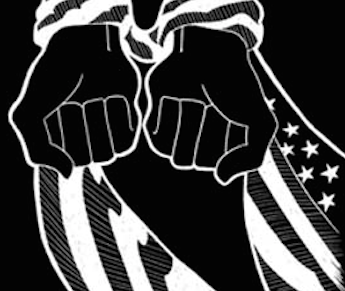I attended two different churches on the Sunday before July 4th. They incorporated the holiday differently in their worship.
One church had each military division carry their respective flags to the stage while the orchestra and the men’s choir played a rousing tune. Then six men clad in green army gear from World War 2, ran down the stage and lifted the American flag, reenacting the famous Iwo Jima flag raising. It was an inspiring production that brought everyone to their feet. When the pastor preached, he made sure to credit God for the blessings of America and that they were celebrating the cost of freedom and the men in service and not the violence of war. He also warned of the danger of idolatry, that as Christians it is always God, first, then country.
In the second church, a head of the American bald eagle with its defiant stare and a wood panel painted in the stars and stripes stood astride the stage. They stood at the foot of the lectern and the pulpit. The liturgist prayed for the country giving praise saying, “It ain’t perfect but I wouldn’t want to be anywhere else,” and the congregation shouted a loud “Amen.” Then in the sharing of prayers of the people, one member offered a historical lesson, that African-Americans never celebrate the 4th of July because on that day, they were slaves and remained slaves even after they helped fight and win Independence, and that until the Civil War where they joined the celebration of the independence from Britain with emancipation from slavery, July 4th never felt like a holiday for them. She then quoted Frederick Douglas who said, “What, to the American slave, is your 4th of July?” And the congregation nodded.
I went and looked up that quote. It was part of a speech before a large, mostly white crowd in Rochester, New York on July 5, 1852, where Douglas continued to say it’s “a day that reveals to him, more than all other days in the year, the gross injustice and cruelty to which he [the slave] is the constant victim.”
I think you might’ve guessed that the second church was a black church and the first, though there were a scattering of people of color, was a white church.
I wondered, the days after, what would’ve happened if someone in the white church pointed out the fact that July 4th was experienced differently and continues to be experienced differently. What if someone recalled the fact that as this new country was forming its own constitution, it debated and finally made a decision to legalize slavery?
If a person raised this historical fact, some would accuse her of being an agitator and ruining a celebratory day with the baggage of the past, that slavery has ended long time ago and let history be laid to rest. Which would be ironic because any holiday, especially a holiday celebrating a birth of a nation, is actually saying history matters. July 4th is about the importance of history, that how we tell our history shapes us.
Which also means, that how we tell our history reveals who we are today and how we want to define ourselves. I’ve, subsequently learned that right after Civil War the most passionate celebrants of July 4th were the recently freed slaves. They’ve experienced the promise of the ideals of Independence day.
So there was a concerted effort in “taking” back this holiday that was becoming “too black.” Ethan J. Kytle and Blain Roberts marshall historical events that show how “Union and Confederate veterans, for instance, buried the hatchet in reunions that emphasized the bravery of all combatants and avoided any reference to slavery or the legacy of emancipation.” Pushing out the memory of slavery and emancipation was a way to choose to whom the holiday belonged.
I think a more honest history makes us more honest about ourselves today, and the more honest we are today, the wiser we can be for tomorrow. The danger of hagiographies is that it imprisons us to our past. We tend to circle back to our past when we don’t mark where we’ve been.
This is why God demands repentance from his people. Repentance is a way forward through and with our past. Repentance is an honest remembrance of the past, not for rueful or masochistic dwelling, but so we can move on because we move on not by forgetting but actually by never forgetting.

